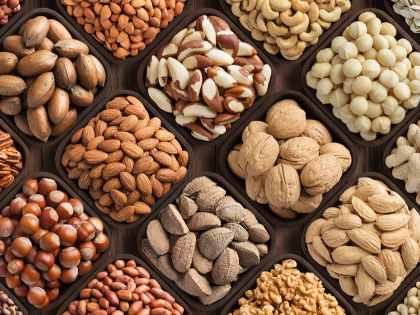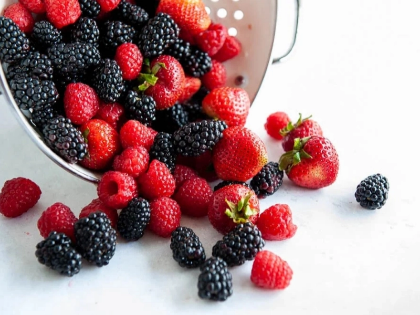Berries: Your Innate Guard Against Cognitive Impairment
It's time to start eating more berries if you are worried about mental impairment as you age. People who consume a portion of berries every day have less cognitive deterioration than those who do not, according to research. Antioxidants and flavonoids, which are abundant in berries, have been shown in experiments to enhance cognitive function. They also have a high concentration of anthocyanidins, a type of flavonoids.
Blueberries
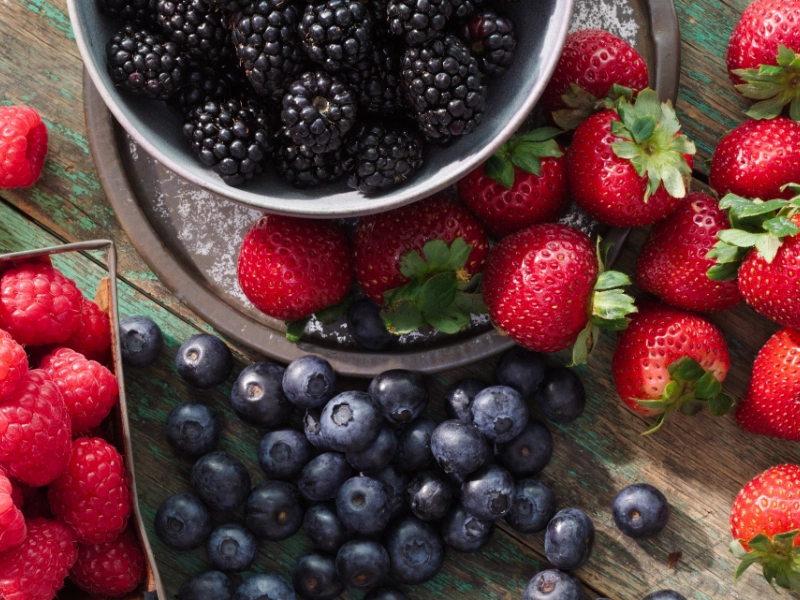
Strawberries
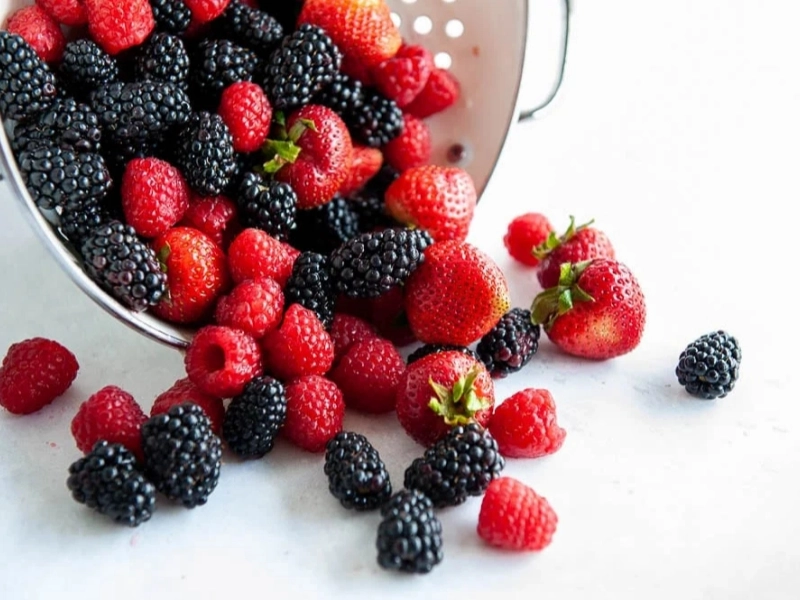 One of the body's earliest defences, polyphenols, are abundant in strawberries. They aid in the reduction of oxidative stress, which is linked to ageing and the development of chronic illnesses. Stable free radicals cannot take electrons from healthy cells and kill them because polyphenols "donate" electrons to them.
Studies on animals have revealed that the polyphenols in strawberries enhance both motor and cognitive performance. This, according to Rush University researchers, is because the anthocyanin pelargonidin, which is present in strawberries, lowers oxidative stress and inflammation in neurons, enhancing neural signalling and enhancing cognitive and motor function.
Thirty overweight individuals with subjective indicators of cognitive deterioration, aged 50-65, participated in their most recent study. Half of the group received whole fruit strawberry powder over the course of 12 weeks, while the other half received a placebo. The findings demonstrated that eating strawberries enhanced cognitive performance and reduced interference errors produced by participants when learning word lists. This suggests that the strawberries are offering some protection against memory disturbance, an issue that is typical with ageing and more severe in dementia patients.
One of the body's earliest defences, polyphenols, are abundant in strawberries. They aid in the reduction of oxidative stress, which is linked to ageing and the development of chronic illnesses. Stable free radicals cannot take electrons from healthy cells and kill them because polyphenols "donate" electrons to them.
Studies on animals have revealed that the polyphenols in strawberries enhance both motor and cognitive performance. This, according to Rush University researchers, is because the anthocyanin pelargonidin, which is present in strawberries, lowers oxidative stress and inflammation in neurons, enhancing neural signalling and enhancing cognitive and motor function.
Thirty overweight individuals with subjective indicators of cognitive deterioration, aged 50-65, participated in their most recent study. Half of the group received whole fruit strawberry powder over the course of 12 weeks, while the other half received a placebo. The findings demonstrated that eating strawberries enhanced cognitive performance and reduced interference errors produced by participants when learning word lists. This suggests that the strawberries are offering some protection against memory disturbance, an issue that is typical with ageing and more severe in dementia patients.
Blackberries
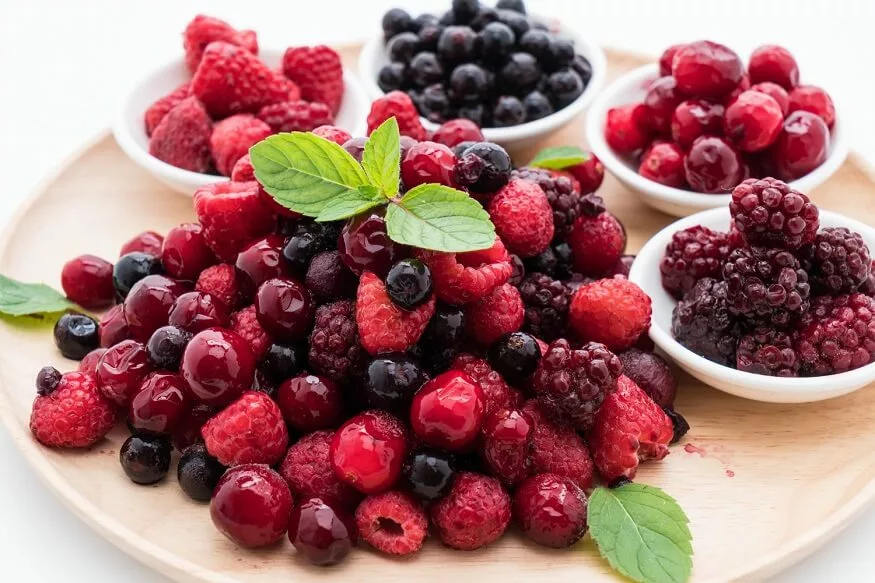 A great source of vitamin C that helps to stave against cognitive degeneration is blackberries. They also include anthocyanins, which have a number of advantages, including enhancing memory and bolstering the immune system, as well as aiding in better digestion, lowering intestinal inflammation, and relieving haemorrhoids.
The effects of berry-based diets or supplements on human cognition and memory have been investigated in a number of clinical investigations. After consuming high-anthocyanin berry juice for three months, older adults with normal cognitive function demonstrated better spatial memory performance in the Spatial Paired Associates Learnt Test and better late recall of word lists on the California Verbal Learning Test when compared to controls.
According to Joseph and Poulose, berries, walnuts, and other plant-based diets can stimulate the brain's built-in housekeeping system, which may help safeguard the ageing brain. The harmful proteins that lead to Alzheimer's disease and other forms of cognitive decline are removed and recycled by this process. The authors propose that the dietary components in these fruits and nuts alter signalling pathways to provide neuroprotective effects. These pathways include those related to neuroplasticity, cell longevity, calcium buffering, stress responses, the synthesis of anti-inflammatory enzymes, and acetylcholinesterase inhibition.
A great source of vitamin C that helps to stave against cognitive degeneration is blackberries. They also include anthocyanins, which have a number of advantages, including enhancing memory and bolstering the immune system, as well as aiding in better digestion, lowering intestinal inflammation, and relieving haemorrhoids.
The effects of berry-based diets or supplements on human cognition and memory have been investigated in a number of clinical investigations. After consuming high-anthocyanin berry juice for three months, older adults with normal cognitive function demonstrated better spatial memory performance in the Spatial Paired Associates Learnt Test and better late recall of word lists on the California Verbal Learning Test when compared to controls.
According to Joseph and Poulose, berries, walnuts, and other plant-based diets can stimulate the brain's built-in housekeeping system, which may help safeguard the ageing brain. The harmful proteins that lead to Alzheimer's disease and other forms of cognitive decline are removed and recycled by this process. The authors propose that the dietary components in these fruits and nuts alter signalling pathways to provide neuroprotective effects. These pathways include those related to neuroplasticity, cell longevity, calcium buffering, stress responses, the synthesis of anti-inflammatory enzymes, and acetylcholinesterase inhibition.
Raspberries
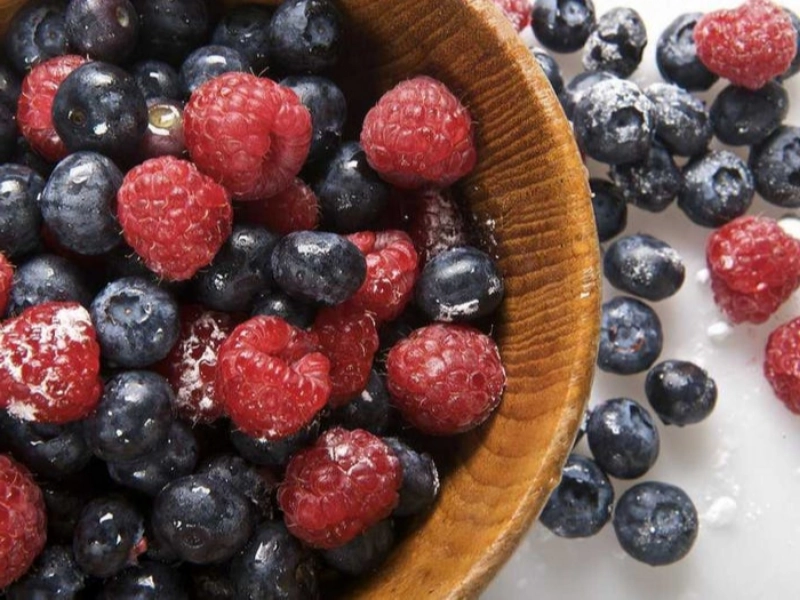 Black raspberries are rich in flavonoids, ellagic acid, and anthocyanins, which give them a wealth of health advantages. They guard against oxidative stress and shield cells from harm. They're a fantastic source of vitamin C as well. Potassium, which is abundant in raspberries, lowers blood pressure and strengthens the heart. They also offer sufficient levels of fibre and omega-3 fatty acids, which support healthy digestive system function.
Consuming foods or supplements containing berries has been shown in numerous clinical trials to enhance adult and elderly people's cognitive function. For instance, compared to control groups, older adults with mild cognitive impairment (MCI) who drank blueberry juice performed better on the California Verbal Paired Acquaintances Learning Test.
Berries and other fruits can help to maintain normal blood pressure, avoid clogged arteries and veins, guard against inflammation, and counteract AGEs, all of which may lower the risk of dementia. Furthermore, research indicates eating berries may enhance brain structure and postpone ageing-related alterations.
Black raspberries are rich in flavonoids, ellagic acid, and anthocyanins, which give them a wealth of health advantages. They guard against oxidative stress and shield cells from harm. They're a fantastic source of vitamin C as well. Potassium, which is abundant in raspberries, lowers blood pressure and strengthens the heart. They also offer sufficient levels of fibre and omega-3 fatty acids, which support healthy digestive system function.
Consuming foods or supplements containing berries has been shown in numerous clinical trials to enhance adult and elderly people's cognitive function. For instance, compared to control groups, older adults with mild cognitive impairment (MCI) who drank blueberry juice performed better on the California Verbal Paired Acquaintances Learning Test.
Berries and other fruits can help to maintain normal blood pressure, avoid clogged arteries and veins, guard against inflammation, and counteract AGEs, all of which may lower the risk of dementia. Furthermore, research indicates eating berries may enhance brain structure and postpone ageing-related alterations.







